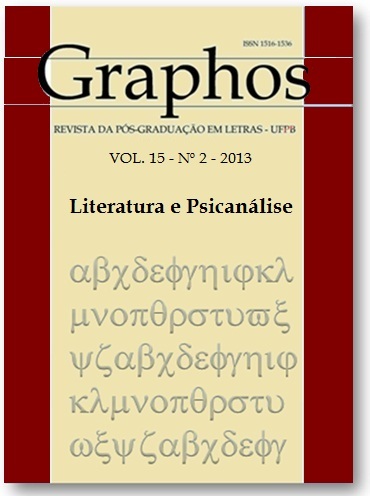O homem na cultura: reflexões a partir da lLteratura e da Psicanálise
Keywords:
myth, culture, human development, PrometeuAbstract
Emphasizing the reading of Prometheus myth and Freud's /Civilization and Its Discontents/, this work approaches aspects related to order, to sharing, to the search for happiness and to living with the suffering. The human being, born into a world of language, unlike other animals, needs to find meaning for its existence. In this article, from four versions of the Greek myth of Prometheus, there is a reflection on the man's endless search for means of finding personal comfort in culture and in socially ordered living. The desire for comfort and pleasure, arising from instinctual manifestation, runs out facing the reality and limitations that life in community imposes. The job, the education and the order produce culture over enjoyment and irrationality.
Downloads
References
ÉSQUILO. (1964). Prometeu acorrentado. In: Teatro Grego. Sel. Intr. notas. Jaime Bruna. São Paulo: Cultrix.
FREUD, Sigmund. (1980). O mal-estar na civilização. In: Obras psicológicas completas de Sigmund Freud. Ed. Standard Brasileira, Rio de Janeiro: Imago, Vol. XXI.
HESIODO. (1991). Os trabalhos e os dias. Intr. Trad. Notas Mary de Camargo Neves Lafer. São Paulo: Iluminuras.
HESIODO. (2003). Teogonia: A origem dos deuses. Est. e trad. Jaa Torrano. 5. ed. São Paulo: Iluminuras.
JAEGER, Werner. (2003). Paidéia: a formação do homem grego. Trad. Artur M. Parreira. São Paulo: Martins Fontes.
PLATÓN. (2005). Protágoras. Gorgias. Carta sétima. Intr. Trad. Javier Martínez García. Seg. reimp. Madrid: Alianza Editorial,
ROUDINESCO, Elisabeth. (2008). A parte obscura de nós mesmos: uma história dos perversos. tradução André Telles; revisão técnica Marco Antonio Coutinho Jorge, Rio de Janeiro: Zahar.
VERNANT, Jean-Pierre. (1992). Mito e religião na Grécia antiga. Trad. Constança Marcondes Cesar. Campinas (SP): Papirus.
VERNANT, Jean-Pierre. (2001). Entre mitos e política. Trad. Cristina Murachco. São Paulo: Universidade de São Paulo.







